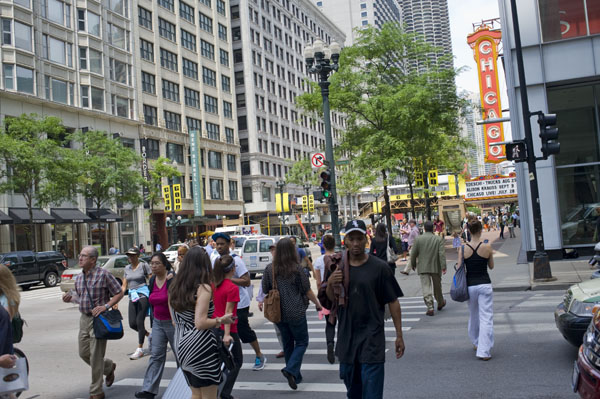Talk about race out loud
By Natalie Moore

Talk about race out loud
By Natalie Moore
This summer WBEZ and vocalo are embarking on a series of stories and conversations about race.
Okay, insert eye roll here.
I understand. Whenever media outlets set out to give special attention to race, it’s my experience that the efforts are often vapid or obvious. Probably yours, too.
Our intention is to provide depth and honesty—with your help. So expect many calls for ideas, comments and conversation over the next few months.
Not long ago, Editor Cate Cahan and I led an all-staff meeting at Chicago Public Media to introduce the idea of a project around race. Our colleagues were understandably skeptical. We heard admonitions that stories and segments should go beyond the obvious, avoid liberal drivel and not “sound like typical public radio.” Most important, we were asked – how real do you want to be?
Very.
Twenty years ago Chicago oral historian Studs Terkel published “Race: How Blacks and Whites Think and Feel About the American Obsession.” The book’s a 400-page collection of personal reflections and experiences – mostly from Chicagoans. For us, the anniversary of Studs’ book is a sort of peg, an opportunity to ask: What’s changed in the past couple of decades in Chicago and its greater area? What has not changed? How do the questions Studs asked, about segregation, equality of opportunity, and hope make sense today? Census data from 2010 confirms what most of us live on a daily basis: We’re one of the most segregated areas in the United States.
But why use a dead white man to jump start race talk?
It’s a fair question, and one we’ve been asked. But when isn’t it a good time to talk about race? Studs Terkel, a master interviewer, drew stories and insights from regular people, young and old, and mostly black and white. That doesn’t mean they have all the answers, certainly not in our increasingly diverse time and place. But for many of us who’ve revisited Studs’ Race, their voices sound true. Peggy Terry, a white woman, said “If there was enough work for everybody, there wouldn’t be so much animosity.” Joseph Lattimore, a black man, said “Being black in America is like being forced to wear ill-fitting shoes. Some people just adjust to it.”
If you are connected in any way with WBEZ and vocalo, you know we routinely deal with race in conversations and coverage.
Now we’re hoping to focus the discussion. And we invite you to join on this page, in the comments section, at #raceoutloud and by calling (888) 635-1112 x2, vocalo’s hotline number, with your stories, your ideas, your experiences and thoughts. If you start up race conversations of your own, let us know that, too.
We’ll be rolling out stories on air a week in June, July and August with a series called Race: Out Loud. First, a little curtain-raising with a broadcast special that revisits some Chicagoans featured in Studs’ 1992 book. That’s May 16th, the centennial of Studs Terkel’s birth.
As Race: Out Loud gets underway, we’ll be talking about segregation and racism in 2012. What’s wrong, if anything, with the picture of segregation in Chicago and its suburbs? We’ll look at the costs of divisions, and question the persistence of inequality. We’ll explore attitudes and stereotypes. There will be a race guilt project and a comedy show. And, again with your help, we’ll look beyond black and white.
We’re looking for uncomfortable truths.
In 1992, I was a sophomore at Morgan Park High School on Chicago’s South Side. The L.A. riots glared in our psyches. “A Different World” was a television hit. The Pharcyde’s “Bizarre Ride” looped in my car. When I saw white people on the Dan Ryan ‘L’ (now the Red Line) south of Cermak, it freaked me out. I never, ever went to Bridgeport. I was taught that’s not where black kids go.
Today, I’m amazed that I frequent diverse restaurants and bars in the South Side neighborhood infamous for its racism.
We asked the venerable Richard Steele what he wanted to do with Race: Out Loud. He said he wanted to lead a conversation in Bridgeport. He’s bringing that conversation to a Bridgeport venue in June.